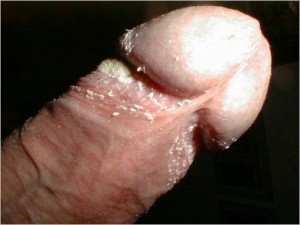Penile Hygiene
 One of the main reasons why there can be an adverse reaction to the foreskin is due to the issue of ‘Smegma’ (Greek = soap). This is the genital secretion that’s common to all mammals, both male and female, and is probably the most misunderstood and unjustifiably maligned and vilified substance produced by the human body. In females, smegma collects around the clitoris and in the folds of the labia minora, whilst in males, it collects underneath the foreskin or in the preputial space. It’s only in human males however that smegma seems to be so offensive as to warrant circumcision to negate its existence. Smegma is made up of a combination of exfoliated epithelial cells, discharged skin oils and moisture and it’s been found to contain 26.6% fats and 13.3% proteins, which is consistent with epithelial debris. Newly produced smegma has a smooth, moist texture and is thought to be rich in squalene and contain prostatic and seminal secretions, desquamated epithelial cells, and the mucin content of the urethral glands of Littré. Smegma is an emollient which is benign, beneficial and necessary because it moisturizes the glans and keeps it smooth, soft, and supple. It has antibacterial and antiviral properties which keep the penis clean and healthy. There is no evidence whatsoever to support the suggestion that smegma causes penile cancer.
One of the main reasons why there can be an adverse reaction to the foreskin is due to the issue of ‘Smegma’ (Greek = soap). This is the genital secretion that’s common to all mammals, both male and female, and is probably the most misunderstood and unjustifiably maligned and vilified substance produced by the human body. In females, smegma collects around the clitoris and in the folds of the labia minora, whilst in males, it collects underneath the foreskin or in the preputial space. It’s only in human males however that smegma seems to be so offensive as to warrant circumcision to negate its existence. Smegma is made up of a combination of exfoliated epithelial cells, discharged skin oils and moisture and it’s been found to contain 26.6% fats and 13.3% proteins, which is consistent with epithelial debris. Newly produced smegma has a smooth, moist texture and is thought to be rich in squalene and contain prostatic and seminal secretions, desquamated epithelial cells, and the mucin content of the urethral glands of Littré. Smegma is an emollient which is benign, beneficial and necessary because it moisturizes the glans and keeps it smooth, soft, and supple. It has antibacterial and antiviral properties which keep the penis clean and healthy. There is no evidence whatsoever to support the suggestion that smegma causes penile cancer.
Smegma if allowed to grow stale can have a pungent aroma (generally compared to a musky, cheesy smell in males or fishy in females)…the odour stemming from the bacterial breakdown of the oils. It is moist in its texture until it is allowed to accumulate, when it takes on a characteristic appearance, which can be best described as paste-like and is generally whitish in colour. Washing regularly with soap and water is the obvious solution to this natural process.
Researchers at the University of Manchester have discovered that the human foreskin has apocrine glands which are specialized glands that produce pheromones, nature’s chemical messengers. Even though many people find the odour of smegma offensive, there are some who are actually turned on by it. There may be pheromonal (sexual attractant) properties present in the smegma secretions. Research into body scents and sexual attraction have shown a correlation between facial attractiveness and an attractiveness of scent. However there doesn’t seem to be any conclusive research into pheromonal smells of sexual secretions and what their implications might be. Mammals are known to communicate with their scent and humans are no different. However, the squeamishness and negativity that many people show towards strong or ‘offensive’ body odours, along with the trend to being over sanitised and their need for ‘pleasant’ and non-offensive odours, make it very difficult to definitively place what, if any, the pheromonal role of smegma might actually be. This is one area that human sexual behaviourists ought to be doing some major definitive research on.
The argument that smegma caused cervical cancer had been one reason used to advocate for male circumcision, but this argument was invalidated when in the 1970’s it was discovered that the Human Papilloma Virus (HPV) was most likely to be the cause of cervical cancers. It has been known of women who specifically had their sons circumcised to supposedly prevent them from causing cervical cancer to women.
As far as penile hygiene is concerned, it may be worth mentioning that there are many intact men who urinate through their foreskins, that is, they don’t retract their foreskins when urinating and that the sensation of warm urine flowing past the foreskin produces rather pleasant sensations. Therefore, inevitably urine becomes trapped in the preputial space, which may contribute to what scents emanate from the penis. Some men wipe their penis after urinating whilst others don’t. Additionally, if masturbation and / or sexual intercourse is occurring there may also be semen which is likewise trapped in the preputial space. If daily penile hygiene isn’t being practiced, then the combination of urine, semen and smegma, can most likely become an aromatic challenge, particularly if there is a partner involved. Ideally, washing underneath the foreskin on a daily basis is the most obvious way of managing the hygiene of an intact penis. This may seem obvious, but there are men and boys who have never been shown or taught how to maintain the hygiene of their genitals. If there is a partner involved, it is a sign of respect and courtesy to ensure that the penis does not get to the stage whereby it’s emitting strong aromas, but this depends on the partner, as it may well be okay with them. Penile hygiene is reasonably straight forward and simple…but it should not be a reason to cut off foreskins.


